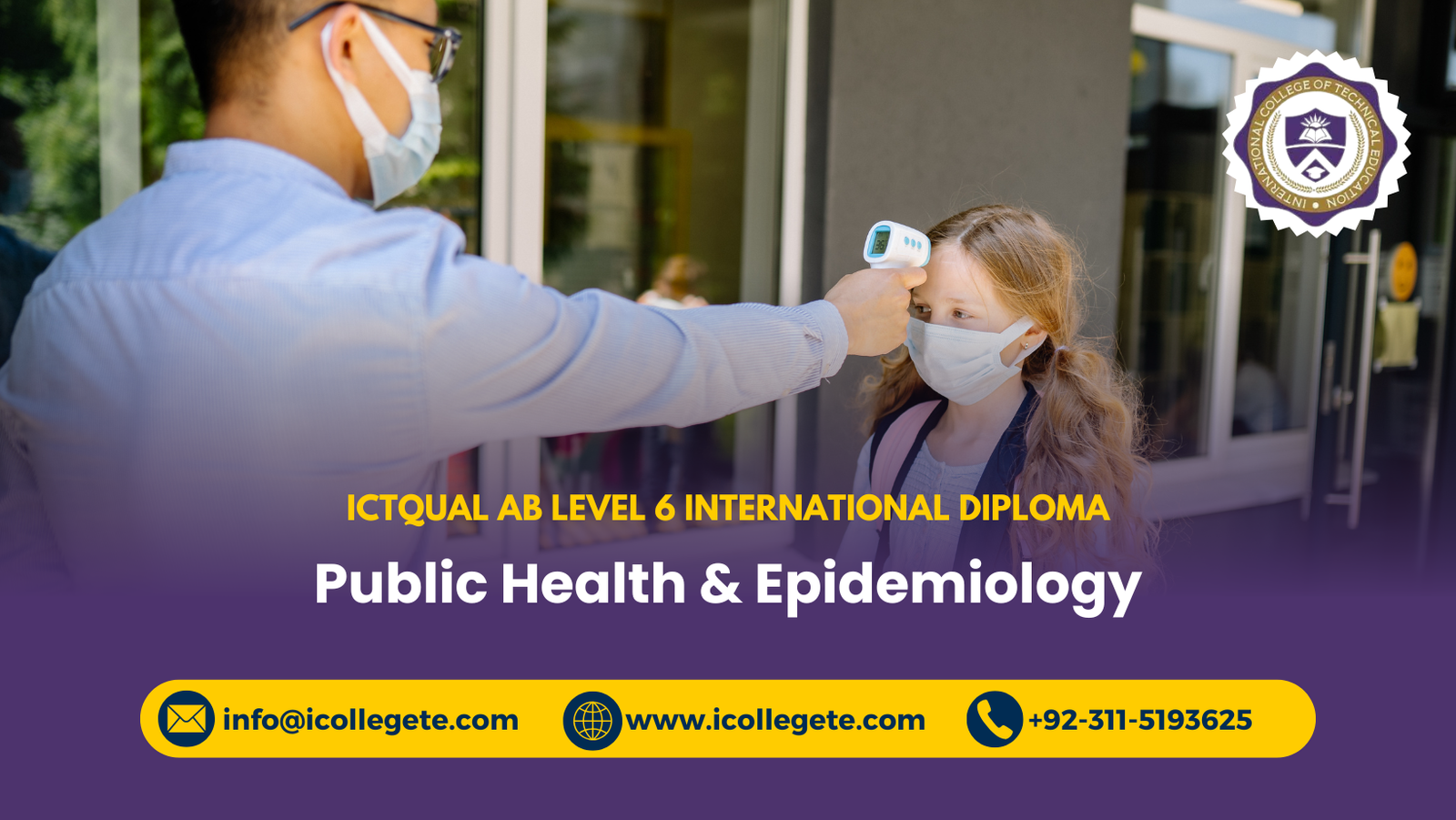The ICTQual AB Level 6 International Diploma in Public Health & Epidemiology is a comprehensive program designed to develop advanced knowledge and practical skills in public health systems, disease prevention, and population health management. This qualification prepares learners to understand the patterns, causes, and control of diseases while promoting health and well-being at local, national, and global levels.
The course covers key areas such as epidemiological research methods, biostatistics, health policy, environmental health, health promotion, and outbreak investigation. Learners gain the analytical and strategic skills needed to assess public health challenges, design effective interventions, and support evidence-based decision-making in healthcare and community settings.
Ideal for aspiring public health professionals, healthcare workers, and policy practitioners, this internationally recognized diploma enhances career opportunities in government health departments, NGOs, research institutions, hospitals, and international health organizations, while also providing pathways for further academic progression in public health and epidemiology.
Year 1: Foundation in Public Health & Epidemiology
- Introduction to Public Health
- Fundamentals of Epidemiology
- Human Anatomy and Physiology for Public Health
- Biostatistics and Health Data Analysis
- Principles of Microbiology and Infection Control
- Health Promotion and Disease Prevention
- Nutrition and Community Health
- Environmental Health and Sustainability
- Health Policy and Systems Overview
- Communication Skills for Health Professionals
- Ethics and Professional Conduct in Public Health
- Introduction to Research Methods in Health Sciences
Year 2: Intermediate Public Health Applications
- Advanced Epidemiology and Study Design
- Infectious Disease Control and Prevention
- Non-Communicable Diseases and Chronic Care Management
- Global Health Issues and Health Systems
- Health Economics and Policy Implementation
- Public Health Surveillance and Monitoring
- Occupational and Environmental Health
- Community Health Assessment and Planning
- Health Informatics and Digital Health Systems
- Programme Evaluation and Impact Assessment
- Leadership and Teamwork in Public Health
- Applied Research Methods in Epidemiology
Year 3: Advanced Specialisation and Professional Application
- Advanced Public Health Interventions
- Clinical Epidemiology and Evidence-Based Practice
- Health Risk Assessment and Management
- Biostatistics for Advanced Research
- Global Health Policy and Strategy Development
- Emergency Preparedness and Disaster Management
- Maternal and Child Health Epidemiology
- Advanced Communicable Disease Control
- Health Communication and Advocacy
- Quality Improvement and Risk Management in Healthcare
- Capstone Research Project / Dissertation
- Professional Practice and Field Placement
- Understand the fundamental principles and scope of public health and epidemiology
- Analyze the distribution, determinants, and control of diseases in populations
- Apply biostatistical methods to interpret health data and research findings
- Design, implement, and evaluate public health interventions and programs
- Conduct epidemiological research using evidence-based methodologies
- Identify and manage communicable and non-communicable diseases effectively
- Assess environmental and occupational factors affecting population health
- Demonstrate knowledge of global health systems and governance structures
- Manage health information systems and interpret surveillance data
- Apply ethical standards and legal frameworks in public health practice
- Promote health equity, sustainability, and social responsibility
- Communicate scientific and health information to diverse audiences
- Integrate interdisciplinary approaches to improve population health outcomes
- Contribute to public health policymaking and strategic planning
- Develop leadership and management competencies in health organizations
- Internationally recognized qualification in public health and epidemiology
- Comprehensive training in disease control, health management, and research methods
- Enhances employability in international health organizations and NGOs
- Strengthens analytical, research, and decision-making skills
- Equips learners with the ability to respond to global health emergencies
- Provides insights into healthcare policy, ethics, and management
- Opens career opportunities in healthcare planning and administration
- Enables understanding of biostatistics and epidemiological modeling
- Fosters leadership and strategic planning in health systems
- Promotes evidence-based practice in health interventions and programs
- Encourages innovation and sustainability in public health initiatives
- Builds global networking opportunities with professionals and researchers
- Prepares learners for postgraduate studies in public health disciplines
- Develops multidisciplinary competence across scientific and policy domains
- Supports lifelong professional growth in healthcare and research sectors
The ICTQual AB Level 6 International Diploma in Public Health & Epidemiology is designed for learners and professionals aiming to build or advance careers in public health, disease prevention, and health research. Enrollment is suitable for:
Healthcare graduates: Individuals with backgrounds in public health, medicine, nursing, pharmacy, biomedical sciences, or related health fields who want to specialize in epidemiology and population health.
Public health professionals: Health officers, community health workers, and NGO staff seeking advanced knowledge in disease surveillance, outbreak investigation, and health policy development.
Researchers and data analysts: Professionals interested in biostatistics, health research, and evidence-based decision-making within healthcare systems.
Career changers: Individuals from social sciences, environmental sciences, or healthcare-related sectors who wish to transition into public health and epidemiology roles.
International learners: With global recognition and progression opportunities, this diploma is ideal for those pursuing local and international careers in government health departments, research institutions, NGOs, and global health organizations.










